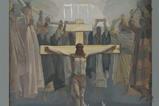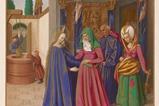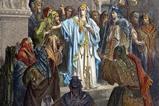Elaine Storkey reveals there were many notable female leaders recognised by Paul, and even an apostle: Junia

Study passage: Romans 16
Most people who know anything about Christian history would be able to tell you that Jesus had twelve apostles, all chosen by him. They travelled with him, learned from him and were eye-witnesses to his teachings and miracles. They sometimes misunderstood him and competed with each other, yet they came to know that Jesus was indeed the Messiah and the Son of God.
Apostles in the early Church
What happened to the apostles after Jesus’ death and resurrection and the focus of the Bible turned to the Church? Well, we know from the Acts of the Apostles and St Paul’s letters that the apostles were actually the ones God used to bring the Church into existence. They were the very ones commissioned by Jesus to “go and make disciples of all nations, baptising them in the name of the Father and of the Son and of the Holy Spirit, and teaching them to obey everything I have commanded you” (Matthew 28:19-20). The apostles were those filled with the Holy Spirit at Pentecost so that they could carry this out.
We would expect to find apostles very active then in the first century…and they were. We read about Philip and the way he was miraculously sent to interpret the Old Testament to a court official of the Queen of Ethiopia (Acts 8:26). We find that Philip’s four daughters were all Christian prophets (Acts 21:9). What is more, new apostles were called by the Holy Spirit. Matthias replaced Judas (Acts 1:12-26); Paul and Barnabas were both referred to as prophets (Acts 13:1), as were James, the brother of Jesus, Titus and Epaphroditus (see, for example, 2 Corinthians 8:23).
There was clearly no shortage of women in leadership in the early Church
Jesus was still calling people through the Holy Spirit into apostolic ministry. We don’t know the background of most of them. Some might have been in those 70 people that Jesus himself sent out to announce the coming of the kingdom (Luke 10); others may, like Paul, have had spectacular conversions. But, whatever their background, these apostles had become key leaders in the body of Christ along with prophets, teachers, discerners, miracle workers, healers, counsellors, givers – all with their special gifts given by the Holy Spirit.
Most people take it for granted that apostleship in the early Church was exercised only by men. Some use that to argue that this was setting down a pattern that we should use even today. Of course our context today is very different, but, even then, this was not actually the case.
We know this from the end of Paul’s letter when he wrote to the Christians in Rome. He listed the names of leaders that he was sending greetings to and wanted to encourage. Almost half of those on this list are women (see Romans 16)! They include Phoebe, a deacon, a married couple, Priscilla and Aquila, both teachers and evangelists (putting her name first as he often did, as the more influential one). He mentioned too Mary, Tryphaena, Tryphosa, Rufus’ mother, Julia and Nereus’ sister. In his Colossians letter he also mentioned Nymphas, who appears to have been a house church leader. So there was clearly no shortage of women in leadership.
The controversy surrounding Junia
What is most surprising for some, is that tucked away in Paul’s greetings to Rome is a woman apostle, Junia. Paul singled her out, along with Andronicus (probably her husband) as “outstanding among the apostles”. As their relative (indicated by other translations) , he spoke from first-hand knowledge of their calling.
But what do we know about Junia? We know she had been a Christian before Paul and had been in prison for her faith. But, sadly, little else. Even the basic fact has been challenged: many writers have argued she couldn’t have been a woman at all! Some translators even changed her name to Junias, to support the idea that ‘she’ was male. Yet for centuries other translators had faithfully left it as a female name, not least because ‘Junia’ was a well-known woman’s name throughout the Latin-Greek world at the time that Paul was writing, whereas the male version ‘Junias’ was virtually non-existent.
God does not favour one sex or the other
Very often, those who were doing their best to turn Junia into a man were often those who felt most strongly opposed to women leaders in the Church. Conversely, those who were known for their support of women’s ministry saw it differently. FF Bruce, a leading 20th-Century Bible scholar, for example, insisted that she and Andronicus were indeed “notable members of the apostolic circle”.
I’m very persuaded by the support of key scholars who did not otherwise approve of women in leadership. They go a long way back. The early Church Fathers were known for their frequent sexism. Tertullian called women “the devil’s gateway” and St John Chrysostom (347-407AD) spoke of women as “weak and fickle”. Nevertheless, Chrysostom was a faithful Bible scholar (as well as being a native-speaking Greek) so his gender attitudes didn’t stop him from reading Paul’s letter to the Romans properly. He didn’t doubt that Junia was a woman. It might be amazing, but he acknowledged it as true:
To be an apostle is something great! But to be outstanding among the apostles—just think what a wonderful song of praise that is! They were outstanding on the basis of their works and virtuous actions. Indeed, how great the wisdom of this woman must have been that she was even deemed worthy of the title of apostle.*
Chrysostom gives more praise to women too when he notes that Paul greeted Mary, saying: “a woman again is honoured and proclaimed victorious…are we men put to shame?…we men are left so far behind by them”. Like hundreds more Bible scholars over the centuries, he affirmed the weight of evidence for women’s leadership in the early Church. The verdict is surely indisputable. Women were acknowledged and named as deacons, elders, teachers, prophets and leaders – and one of them was an apostle.
What does this mean to us today?
The Bible was written over many centuries and spoke into many male-dominant societies, which saw women as subordinate. Women lived lives of prescribed roles with identities already mapped out clearly by their culture. And yet, in the very midst of this, we can see God’s liberating power at work, freeing women up to be whom God called them to be.
This is especially true in the New Testament, when the Holy Spirit was poured out on the Church and women and men together received the gifts needed for the spread of the gospel. Women were empowered as evangelists and pastors with gifts of preaching and discernment so that people could hear the good news of Jesus, repent of their sins and turn to follow him.
This is no different for us today. We have examples of sexism and patriarchy in our own culture, which come in ever more varied and strange ways. The Church is called by God to witness against this: to let others know that our createdness is given to us by God as a blessing; that God does not favour one sex or the other but welcomes all those who turn in faith to follow Jesus and gives them gifts for service.
Women did have great significance in the early Church; the Church should never try to distort scripture when it reveals something we might find uncomfortable. Nor should the Church ignore scripture when it spells out the cost of being a disciple of Christ. We are asked to allow the Holy Spirit to examine our hearts, to put aside our own self-interest so we can seek God’s will. And we are to stand in compassion and advocacy with those who are victims, whether of sexism or injustice, and speak as prophets for those whose voice are muted.
Our true humanity is something the Bible reveals constantly. We are made in the image of God, created to love and serve, urged to be like Jesus and trust him. Paul’s affirmation of the apostle Junia endorses the truth of Galatians 3:28; that: “there is neither Jew nor Gentile, neither slave nor free, nor is there male and female, for [we] are all one in Christ Jesus.” This doesn’t mean that our rich ethnic heritages disappear, or we ignore modern-day slavery, or that sex and biology don’t exist. It does mean that, in Christ, the barriers that we have erected between people on the basis of these things must be pulled down.
*Source: Chrysostom: In Epistolam ad Romanos, Homilia 31, 2 (PG 60:669f.).
Second was quoted by Leonard Swidler, Biblical Affirmations of Woman (Philadelphia: Westminster, 1979),p 299. (Original Chrysostom source at: PG 51:668f.)

































No comments yet